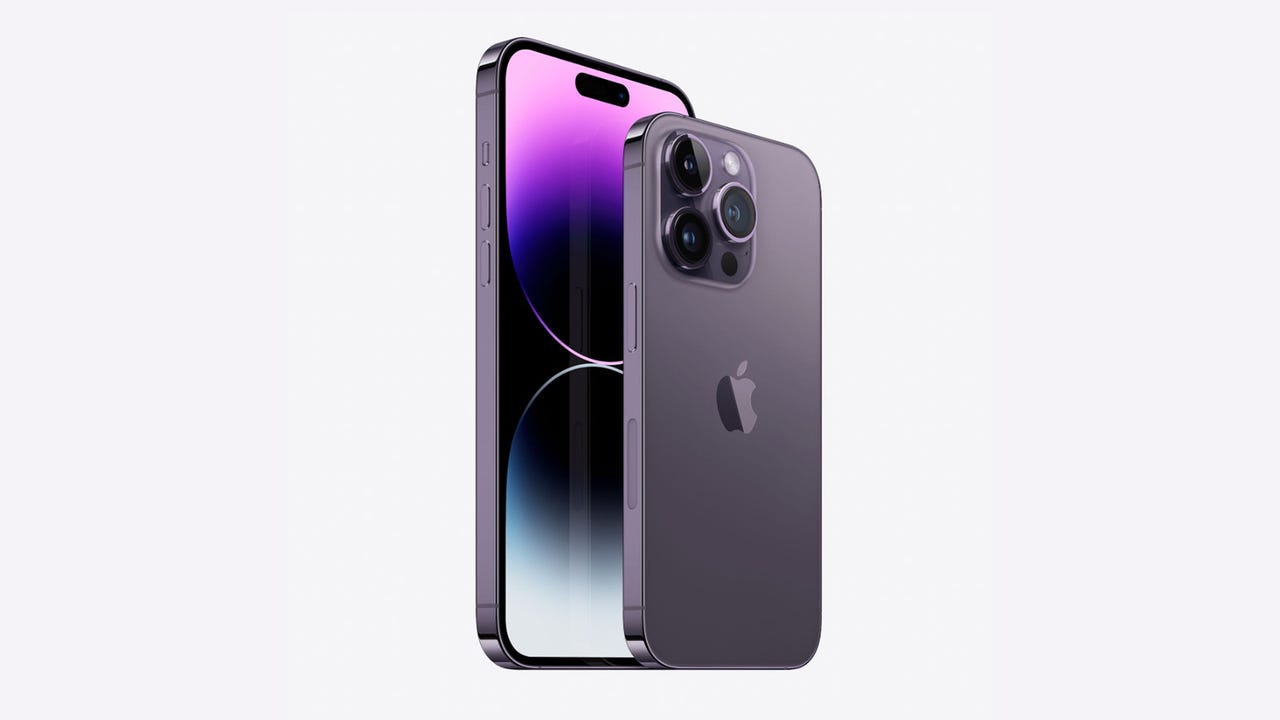
































Apple's iPhone 14 Pro has a powerful 48MP camera sensor but the same old Lightning cable connector
Image: AppleSo theiPhone 14 Pro is impressive. Really impressive -- its 48MP sensor on its main camera lens allows the device to capture the biggest and most detailed photos yet on an iPhone device. It can also capture stunning 4K video at 24 or 30 fps in Cinematic mode with optical zoom quality, and has a new "Action" video mode.
And Apple certainly wants you to shoot professional-quality content with the iPhone Pro's camera. In fact, the company made an entire advertising campaign out of it.
But bigger sensors also mean bigger files. How much bigger? Well, an uncompressed 48MP ProRAW photo will be 75MB in size, and when using ProRes, 4K video will use as much as 6 gigabytes per minute of your iPhone 14 Pro's storage.
This lineup of aerial hardware fits a variety of enterprise photography and video use cases.
Read nowFor those of us that go photo crazy and want to use the 48MP ProRAW capabilities of the new sensor, that is quite a lot of file space if you shoot a lot of exposures (say 100) during a single photography session or start recording five or 10-minute 4K clips. You'll want to empty your device to your Mac or your PC, or perhaps your iPad, where you can do desktop-style photo edits.
If you have ever had to transfer video from your iPhone to your Mac using a Lightning cable, you probably know just how slow that is. First, the Photos app has to synchronize and index the file listings and thumbnails, which takes a while. Then you have to do an import procedure.
How slow is Lightning? Well, because it is a USB 2.0 technology, rather than a USB 3.2 or 4.0 technology, it has a maximum transfer rate of 480Mbps or roughly 60 megabytes per second (MB/s).
Editor's note: we had to redo all our math in this section. If you ever want to calculate data transfer rates, try thisgreat calculatorby Omni Calculator.
So that means if you have a hundred 75MB ProRAW photographs (7500 MB) you need to transfer on your iPhone 14 Pro, it might take you upwards of two minutes at 480 megabits per second, assuming optimal transfer rates. Realistically, it will probably be more because of the indexing, because it's not just a simple copy from a mounted filesystem and there will be protocol overhead.
A five-minute 4K ProRes video clip at 6GB per minute will be roughly 30GB. At that rate, it could take you 8 minutes to transfer that much data over a Lightning cable. If you are using the Photos or iMovie database to store them, the indexing could take significantly longer.
We don't have the full specifications on whether or not the iPhone 14 has been upgraded to USB 3 -- some of the latest iPads have USB 3.2 connectivity, but those use USB-C connectors.
How fast is USB 3.2? The theoretical upper limit for Generation 1 is 4.8Gbps or 600 megabytes per second (MB/s). USB 3.2 Gen 2 is 10Gbps, and USB 3.2 Gen 2x2 is 20Gbps. And USB 4/Thunderbolt 3? 40Gbps or 5000 megabytes per second, an over 80 times increase over USB 2.0 transfer rates.
(Yeah, we know, it's confusing. Don't ask Ed Bott to tech-edit your post before your first coffee.)
Now, Apple may have upgraded that Lightning connector this year -- nobody has examined an iPhone 14 Pro closely yet. But it's also possible that it hasn't because the European Union will force Apple to use USB-C next year, so Apple could be waiting to make more drastic changes to its chipsets and connectors. Or Apple could decide to ditch cables entirely.
It's certainly possible to AirDrop photos to your Mac. The iPhone 13 Pro Max had a maximum transfer rate over Wi-Fi of about 1200Mbps, using an 80Mhz channel on a 5Ghz band with two spatial streams. That's an improvement over USB 2.0 -- about 2.5 times faster.
But it's only about a quarter as fast as USB 3.2 Gen 1, let alone a USB 4/Thunderbolt cable. Using Wi-Fi 6, 802.11ax's upper-end maximum data rate is much higher than that, but only on devices with 160Mhz channels using four or more spatial streams. A MacBook Pro can only support two spatial streams like the iPhone, so AirDrop is maxed out at 1200Mbps.
I'm not expecting the iPhone 14's comms stack to be that much better than its predecessor, even with a homegrown wireless chipset, if in fact, that is what they ended up using this year.
Remember that while reading from the iPhone's flash memory is very fast, and AirDrop is also fast, you are also constrained by the write speeds of the destination computer you are transferring files to. That's not a problem on content creation-level systems, though; on a high-endMacBook Pro M1 Max , you can get write speeds up to 7.5GB per second on its internal SSD.
We haven't even come close to saturating that with the USB 2.0 speeds of Lightning at 60MB/s.
But there still aren't good built-in toolsets currently for dragging and dropping bulk photos and videos wirelessly from your iPhone to your Mac (you can't AirDrop to a PC); Apple makes you use iCloud.
This is not what you want as a professional content creator; you want the fastest direct connection possible. There are 3rd-party tools for this, but they aren't always reliable.
I guess there's always next year.
 Tags quentes :
Tecnologia
Nosso processo
Smartphones
iPhone
Tags quentes :
Tecnologia
Nosso processo
Smartphones
iPhone